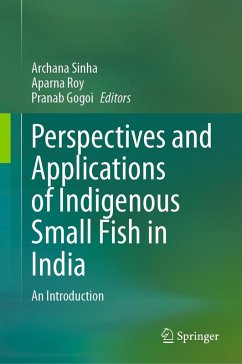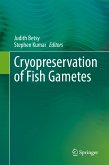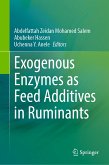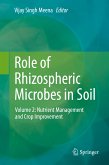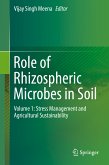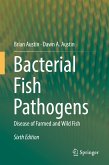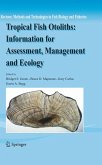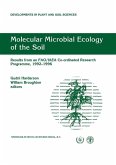Perspectives and Applications of Indigenous Small Fish in India (eBook, PDF)
An Introduction
Redaktion: Sinha, Archana; Gogoi, Pranab; Roy, Aparna


Alle Infos zum eBook verschenken

Perspectives and Applications of Indigenous Small Fish in India (eBook, PDF)
An Introduction
Redaktion: Sinha, Archana; Gogoi, Pranab; Roy, Aparna
- Format: PDF
- Merkliste
- Auf die Merkliste
- Bewerten Bewerten
- Teilen
- Produkt teilen
- Produkterinnerung
- Produkterinnerung

Hier können Sie sich einloggen

Bitte loggen Sie sich zunächst in Ihr Kundenkonto ein oder registrieren Sie sich bei bücher.de, um das eBook-Abo tolino select nutzen zu können.
This contributed volume covers all aspects of small indigenous fish for nutritional and livelihood security. The availability, descriptions and identification of common small indigenous fish provides potential and prospects of fish production from inland open water system. In addition, individual chapters are added on growth, feeding, diseases and health management of these small fishes. Essential information is provided on packaging and transport of these fishes. Specific chapters provide information on nutritional value of fishes, value addition and product development by using small…mehr
- Geräte: PC
- ohne Kopierschutz
- eBook Hilfe
- Größe: 36.06MB
![Cryopreservation of Fish Gametes (eBook, PDF) Cryopreservation of Fish Gametes (eBook, PDF)]() Cryopreservation of Fish Gametes (eBook, PDF)161,95 €
Cryopreservation of Fish Gametes (eBook, PDF)161,95 €![Exogenous Enzymes as Feed Additives in Ruminants (eBook, PDF) Exogenous Enzymes as Feed Additives in Ruminants (eBook, PDF)]() Exogenous Enzymes as Feed Additives in Ruminants (eBook, PDF)129,95 €
Exogenous Enzymes as Feed Additives in Ruminants (eBook, PDF)129,95 €![Role of Rhizospheric Microbes in Soil (eBook, PDF) Role of Rhizospheric Microbes in Soil (eBook, PDF)]() Role of Rhizospheric Microbes in Soil (eBook, PDF)113,95 €
Role of Rhizospheric Microbes in Soil (eBook, PDF)113,95 €![Role of Rhizospheric Microbes in Soil (eBook, PDF) Role of Rhizospheric Microbes in Soil (eBook, PDF)]() Role of Rhizospheric Microbes in Soil (eBook, PDF)121,95 €
Role of Rhizospheric Microbes in Soil (eBook, PDF)121,95 €![Bacterial Fish Pathogens (eBook, PDF) Bacterial Fish Pathogens (eBook, PDF)]() Brian AustinBacterial Fish Pathogens (eBook, PDF)233,95 €
Brian AustinBacterial Fish Pathogens (eBook, PDF)233,95 €![Tropical Fish Otoliths: Information for Assessment, Management and Ecology (eBook, PDF) Tropical Fish Otoliths: Information for Assessment, Management and Ecology (eBook, PDF)]() Tropical Fish Otoliths: Information for Assessment, Management and Ecology (eBook, PDF)161,95 €
Tropical Fish Otoliths: Information for Assessment, Management and Ecology (eBook, PDF)161,95 €![Molecular Microbial Ecology of the Soil (eBook, PDF) Molecular Microbial Ecology of the Soil (eBook, PDF)]() Molecular Microbial Ecology of the Soil (eBook, PDF)73,95 €
Molecular Microbial Ecology of the Soil (eBook, PDF)73,95 €-
-
-
Dieser Download kann aus rechtlichen Gründen nur mit Rechnungsadresse in A, B, BG, CY, CZ, D, DK, EW, E, FIN, F, GR, HR, H, IRL, I, LT, L, LR, M, NL, PL, P, R, S, SLO, SK ausgeliefert werden.
- Produktdetails
- Verlag: Springer Nature Singapore
- Seitenzahl: 593
- Erscheinungstermin: 8. Juli 2024
- Englisch
- ISBN-13: 9789819715862
- Artikelnr.: 71233506
- Verlag: Springer Nature Singapore
- Seitenzahl: 593
- Erscheinungstermin: 8. Juli 2024
- Englisch
- ISBN-13: 9789819715862
- Artikelnr.: 71233506
- Herstellerkennzeichnung Die Herstellerinformationen sind derzeit nicht verfügbar.
